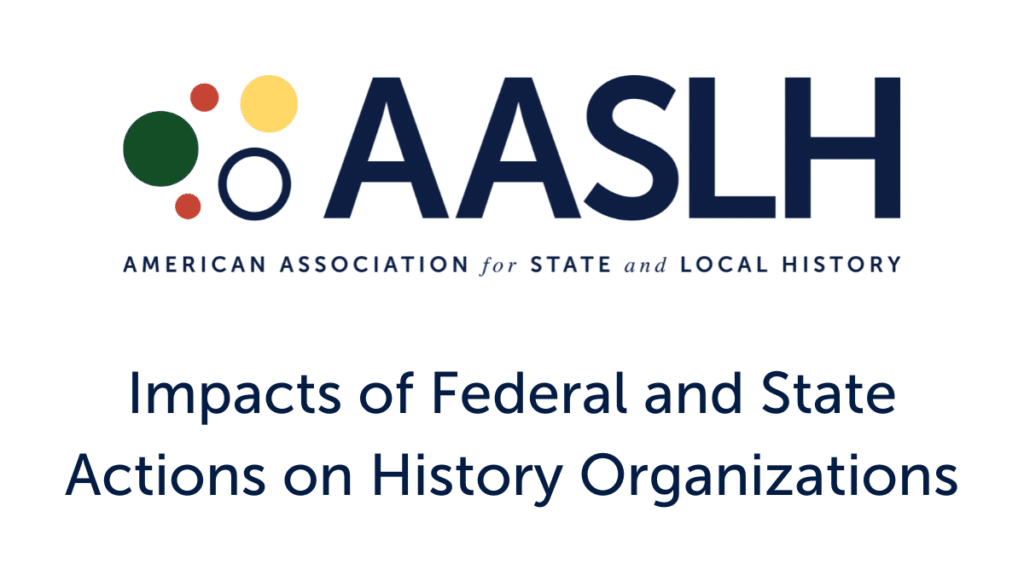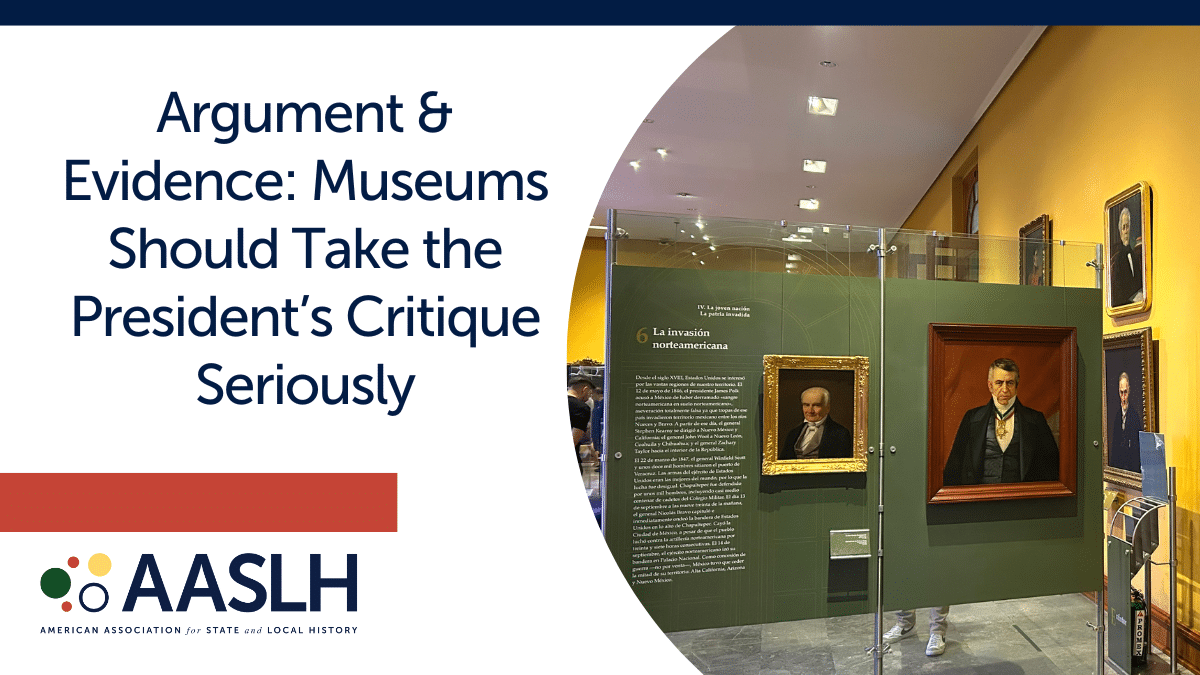Recent federal and state actions are creating a difficult and uncertain environment for the history field. With your help, AASLH is gathering examples of the impact on history organizations.
Has your organization also been impacted? We want to hear from you. Please share your story to help AASLH better understand—and draw attention to—the impact on the field of recent government actions related to history, education, and the workforce. Your response can be kept strictly confidential. We are asking for your email address in case AASLH staff want to follow up for more information. That field is optional.
Here are a sample of the responses we’ve received so far and that we have permission to share:
Responses Shared as of April 15, 2025
The Heart Mountain Wyoming Foundation, an organization dedicated to preserving and memorializing the Heart Mountain World War II Japanese American Confinement Site, has five outstanding grant applications with IMLS, NPS, and NEH worth a total of $1.2 million. The unclear future of grants at these federal agencies has put the Foundation in a state of uncertainty.
Due to recent executive actions against history and cultural institutions, the Maine State Museum is experiencing damaged morale and heightened anxiety among its staff, as well as the potential loss of a $245,000 IMLS grant in support of an upcoming exhibition. Losing this IMLS support would pose a significant setback both to installing the new exhibition and to re-opening the Museum, which had been tentatively scheduled for April 2026 and will now likely be postponed.
Historic Red Hook, a small nonprofit organization in New York that preserves its community’s history, maintains a historic site, and runs public programs, has not received payment for its Humanities New York grant due to federal budget decisions. The organization is uncertain as to whether it will ever receive payment and is finding it increasingly hard to find grant programs now that IMLS and similar agencies are experiencing cuts. The organization had hoped to use grant funds to expand its operations and restart school tours.
The Jane Addams Papers Project at Ramapo College of New Jersey is supported by the National Historical Publications & Records Commission (of the National Archives) and NEH, and the Project has proposals in to both agencies. The Project is now experiencing confirmed or possible delays in decisions and funding on both proposals, meaning they are facing months-long gaps in payment for the project, including funding that pays the salaries for staff. This uncertainty is threatening staff morale, the project’s overall viability, and complicating efforts to find replacement funding.
The Venice Heritage Museum, a small, one-year old museum in California, took on the stewardship of thousands of items donated by its community with the understanding that they would hire an archivist to preserve and make accessible this new collection. A pending grant with IMLS to fund the hiring of this position is now at risk.
An independent museum consultant in Pennsylvania has had multiple projects adversely affected by executive efforts to hinder funding and limit the content of historical work. For instance, a potential new client who has asked the consultant to write an NEH grant on their behalf has canceled plans to apply, as the grant will no longer be funded due to its focus on underrepresented communities. In another example, a privately funded project the consultant was working on for a government agency has been paused because the content is unlikely to be approved, even though funding is coming from another source.
A federal historian reported that articles they had written about the history of Filipinos in the U.S. Army and about a project that resulted in 22 soldiers of Asian American heritage being awarded Medals of Honor for World War II service have been removed from federal websites in accordance with executive orders seeking to inhibit diversity, equity, and inclusion efforts. The federal historian’s agency is also facing a potential reduction in force.
An independent history contractor in Minnesota who conducts required evaluation of IMLS-supported projects emphasized that federal cuts to IMLS will put independent evaluators out of work. These cuts also limit the ability of museums to measure the impact of their programs and services, as well as their capacity to make informed decisions about how to best serve their communities.
The Kauffman Museum, located in Kansas, is finding that host venues are canceling reservations for one of the Museum’s most consistently booked traveling exhibits, “Sorting Out Race,” due to concerns about the content precipitated by executive actions. The Museum also sends exhibits to Canada and is uncertain of how customs and travel restrictions from the White House might impede future bookings.
Responses Shared as of March 31, 2025
Staff at Cass County Historical Society in Missouri are anticipating disruption to their Institute for Museum and Library Services funding in light of recent executive orders. The organization’s IMLS grant has enabled them to order preservation and archival materials and hire two interns to help process a backlog of donations. The historical society may also lose support it receives via the Freedom’s Frontier National Heritage Area (NHA), as funding for NHAs is at risk in the FY26 federal budget. The prospect of these sources of federal funding disappearing is lowering staff morale, imperiling the organization’s ability to serve its community, and risking the loss of the interns to more stable employment.
The Ridgewood Historical Society in New Jersey applied for federal grants through the Institute of Museum and Library Services and National Endowment for the Humanities for an ongoing inventory and improved access project. The project would benefit the numerous exhibitions, lectures, and other educational programs the institution offers as one of the community’s few sources of connection to local history and culture. With these federal grants uncertain and as the historical society is ineligible for state grants due to its small operating budget, the project is now at risk.
Christiansburg Institute, Inc., a small Black history museum and cultural heritage nonprofit in Virginia, is fully funded through grants from federal agencies, including the Institute of Museum and Library Services. If the recent executive order seeking to downsize IMLS stands, the Institute will be forced to shut its doors, risking the organization’s archival collection, putting five museum practitioners out of work, and closing the only Black history museum in their county.
The 1816 Farmington Quaker Meetinghouse in New York is struggling to confirm the status of a National Park Service historic preservation grant the organization received for restoration of the historic site. The Meetinghouse is part of the proposed Harriet Tubman Underground Railroad Heritage Corridor—a route expected to drive heritage tourism and economic development—and will be unable to complete the restoration work without the NPS funding.
First State Heritage Park, a Delaware state park, relies on federal funding through partner organizations to make possible programs that reach thousands of people. These programs are now at risk. Executive actions against the National Park Service are similarly imperiling the historic site’s fourth-grade field trip event, which is supported by NPS and serves over 1,300 low-income students annually.
A state history agency reported that their state’s legislature is parroting the federal government and that the agency is now subject to a state-equivalent of the Department of Government Efficiency (DOGE). The agency reported that they have been required to remove all diversity, equity, and inclusion-related language from their website. The agency’s employees have also been called back into the office full-time without cost-of-living increases or accomodations.
Updated April 15, 2025




